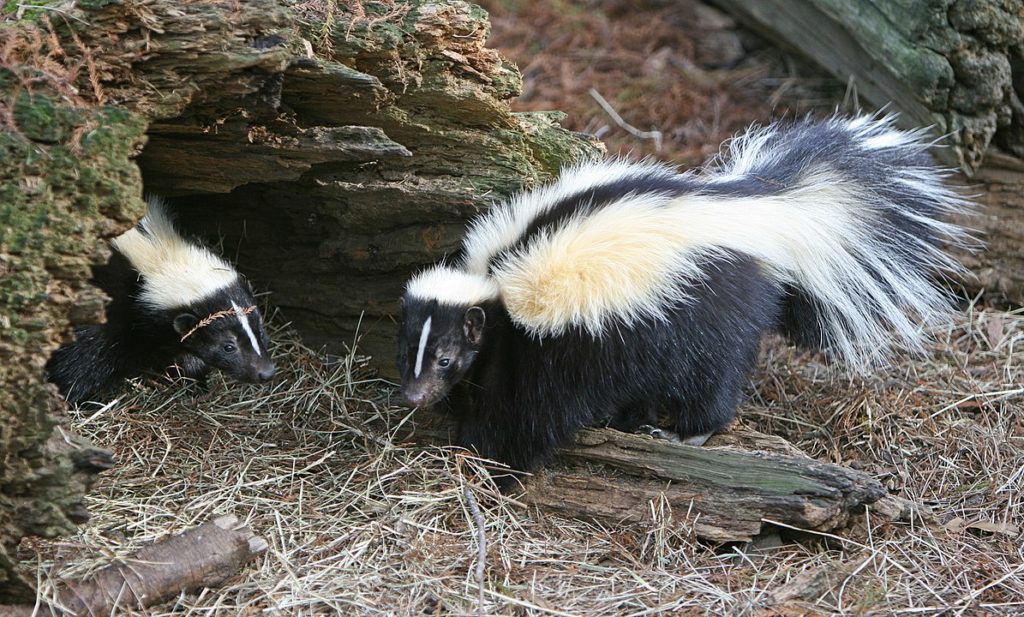
I learned this today. Skunks smell so bad because they spray an organic compound that has sulfur in it.
Skunks are mostly native to north and south America, although there is also a species of skunk that lives in Indonesia. This is called the Sunda stink badger. There are generally ten different species of skunk. They all vary in size and weight, with the smallest being 15 cm long and 500 g in weight and the heaviest being close to a meter long and 8 kg in weight. However, they all have the same ability to spray a foul-smelling liquid.
The word “skunk” probably comes from the word sengaku in the Abenaki language that means “urinate” and “fox”. This evolved into “skunk”. The Abenaki language is an endangered language that was spoken by the people who lived in Quebec and the northern states of New England.
So, why do skunks smell so bad? Skunks have evolved a very effective defensive mechanism that makes them safe from pretty much every predator that they come across. Not even bears will go near skunks if they can help it. They have a big white stripe down the middle of their backs to let any interested predators know that they are not to be messed with.
They have two glands to either side of their anus, just underneath their tail. These glands make an oily chemical that consists of thiols. Thiols are organosulfur compounds, and many of them have strong odors. There are two places you may have come across the pleasant aroma of thiols. The first is in sweat. That delightful aroma of sweat is thanks to the thiols. The second place is in natural gas. Since 1937, gas companies have been required to add a scent to natural gas so that people know if there is a gas leak. Natural gas on its own is odorless, so thiols are added to give it that distinctly “gassy” smell. Some thiols do smell nice. The delightful aroma of roasted coffee is down to thiols.
The thiols in skunk spray are sulfur compounds and have a rotten egg smell. Most animals, and us as well, have a strong dislike of that smell because the smell is given off by hydrogen sulfide, which is a naturally occurring gas given off by decaying food. We have evolved to hate that smell because it keeps us from poisoning ourselves. Skunks have evolved to create that smell for that exact reason.
Skunks have nipple like protrusions on each of these glands that allows them to aim their spray. They can spray it pretty accurately up to 3 m. The spray has other components in it as well that make it very sticky and extremely difficult to get off. It can soak through clothes and fur. Research has shown that the smell can last for up to 21 days if left untreated.
However, skunks do not have an endless supply of this spray. At most, they can spray about 6 times before they run out. They usually don’t need to spray more than once before the encroaching predator has got the message, though. After they have used up all of the spray, they have to make more, and it can take them up to ten days to produce it again.
Because of this, skunks use the spray as a last resort. Their first line of defense is their coloring. They look like skunks, and most animals have learned that they don’t want to attack skunks. The second thing they do is to hiss and stamp their feet. If a skunk is near you and is doing this because it feels threatened, get out of there quickly. The skunk doesn’t want to spray if it can help it.
The last thing the skunk does before it sprays is to lift its tail. They hold their tail high to increase their size, but they keep their head pointing towards the enemy so that they can see what is happening. They have very fast reflexes and can spin around incredibly quickly, bringing their spray glands into firing line.
Because of their visibility and the fact that almost all predators hate the smell of sulfur, the skunk has almost no predators. That is, save one. The great horned owl is a big predator of skunks. They can grow up to about 60 cm tall and are very large, but their size is not what makes them effective skunk predators. It is their almost complete lack of smell. Quite often the nests of great horned owls smell terribly of skunk spray.
If you do happen to get sprayed by a skunk, you need to use a detergent that removes oil and grease. Baking soda can also help remove the smell as well.
So, skunks have glands either side of their anus that produce a spray that contains thiols that smell of sulfur. And that is what I learned today.
Image By http://www.birdphotos.com – Own work, CC BY 3.0, https://commons.wikimedia.org/w/index.php?curid=4409510
Sources:
https://en.wikipedia.org/wiki/Skunk
https://en.wikipedia.org/wiki/Algonquian_languages
https://en.wikipedia.org/wiki/Abenaki_language
https://en.wikipedia.org/wiki/Thiol
https://en.wikipedia.org/wiki/Mephitidae
https://en.wikipedia.org/wiki/Great_horned_owl
https://wonderopolis.org/wonder/why-do-skunks-stink
https://www.quora.com/Why-does-Sulfur-smell-so-bad
